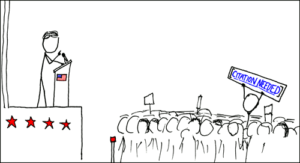As you may know, I buy too many books. Well, define “too many.” Here’s my excuse: I have to become immersed in the history and culture of 1775 in order to write the novel. Yeah, that’s the ticket.
Recently I bought the book Angel in the Whirlwind: The Triumph of the American Revolution by Benson Bobrick. It has pretty good reviews.
Upon opening the book, I did what I always seem to do – I turned to the section on April 19th. Since I know more about that day than other bits and pieces of Rev War history, my sensors are more tuned to see things that just might be “off.”
Now, don’t get me wrong here – it’s probably a fine book.
The first thing I found, though, that made me go “hmmm” was when the author stated (page 113) that “he (Gage) dispatched 800 troops under Colonel Francis Smith and Major John Pitcairn to capture Adams and Hancock and seize the rebels’ stores.” The sentence was not footnoted.
 Now certainly, Gage had been told in a letter from the Earl of Dartmouth, dated January 27, 1775, “It is the opinion of the King’s servants, in which His majesty concurs, that the first and essential step to be taken toward reestablishing Government, would be to arrest and imprison the principal actors and abettors of the Provincial Congress whose proceedings appear in every light to be acts of treason and rebellion.”
Now certainly, Gage had been told in a letter from the Earl of Dartmouth, dated January 27, 1775, “It is the opinion of the King’s servants, in which His majesty concurs, that the first and essential step to be taken toward reestablishing Government, would be to arrest and imprison the principal actors and abettors of the Provincial Congress whose proceedings appear in every light to be acts of treason and rebellion.”
And there are speculations that one of the reasons the Lexington training band was on the green that morning was their suspicion of just that. Some believe (and I don’t think it’s unreasonable) that Captain Parker had his men there to protect Hancock and Adams, who were staying at the Clarke residence just up the road from the green.
But I haven’t seen primary sources that Smith’s orders included arresting Hancock and Adams. Here are Smith’s orders:
Tuesday, April 18, 1775
Orders from General Thomas Gage
to Lieut. Colonel Smith, 10th Regiment 'Foot
Boston, April 18, 1775
Lieut. Colonel Smith, 10th Regiment 'Foot,
Sir,
Having received intelligence, that a quantity of Ammunition, Provisions, Artillery, Tents and small Arms, have been collected at Concord, for the Avowed Purpose of raising and supporting a Rebellion against His Majesty, you will March with a Corps of Grenadiers and Light Infantry, put under your Command, with the utmost expedition and Secrecy to Concord, where you will seize and destroy all Artillery, Ammunition, Provisions, Tents, Small Arms, and all Military Stores whatever. But you will take care that the Soldiers do not plunder the Inhabitants, or hurt private property.
You have a Draught of Concord, on which is marked the Houses, Barns, &c, which contain the above military Stores. You will order a Trunion to be knocked off each Gun, but if it’s found impracticable on any, they must be spiked, and the Carriages destroyed. The Powder and flower must be shook out of the Barrels into the River, the Tents burnt, Pork or Beef destroyed in the best way you can devise. And the Men may put Balls of lead in their pockets, throwing them by degrees into Ponds, Ditches &c., but no Quantity together, so that they may be recovered afterwards. If you meet any Brass Artillery, you will order their muzzles to be beat in so as to render them useless.
You will observe by the Draught that it will be necessary to secure the two Bridges as soon as possible, you will therefore Order a party of the best Marchers, to go on with expedition for the purpose.
A small party of Horseback is ordered out to stop all advice of your March getting to Concord before you, and a small number of Artillery go out in Chaises to wait for you on the road, with Sledge Hammers, Spikes, &c.
You will open your business and return with the Troops, as soon as possible, which I must leave to your own Judgment and Discretion.
I am, Sir,
Your most obedient humble servant
Thos. Gage.
Now I have never claimed to be a scholar. I have no letters behind my name indicating degrees in anything. I am merely a self-taught writer who is fascinated by history.
But as I study and read, I find myself looking at claims like this one and wanting the citation. I am determined to get the history as right as I can as I write this blog and as I write the novel(s).
And when I digress from what the primary sources tell us, I say so. (Someday I’ll tell you my theory of Sam Prescott ending up on that road to Concord that night. It is totally a theory, but an “educated” one.)
I guess the question that’s hanging out there now is how much I cite my writing. Maybe not enough. And is that even something that blog readers care about?
I don’t know. You tell me.
By the way, I did find other things in that chapter that could have been worded more precisely and left the wrong impression. I may pick up the book again. But I might not, too.

